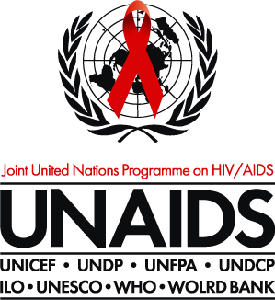By Staff Writer, PinkNews.co.uk • December 22, 2008 - 17:59

UNAIDS coordinates the fight against HIV
The United Nations agency responsible for coordinating global efforts to combat HIV and AIDS has called for "enhanced action to promote and protect the human rights of men who have sex with men, transgender people, lesbians, gays and bisexuals."
Last Thursday the UN General Assembly heard a statement on the universal human rights of LGBT people, and at the same time UNAIDS and the United Nations Development Programme issued their own joint statement:
"The unanimous commitments of Member States to achieve universal access to HIV prevention, treatment, care and support by 2010 and Millennium Development Goal 6 – to halt and reverse the spread of HIV by 2015 – include commitments to further the realisation of human rights for all, including for all those vulnerable to HIV infection and to the impact of AIDS.
"Such commitments confirm the fact that the realisation of human rights for all is not only right but also leads to the most effective response to HIV and generates broader health and development benefits.
"However, many people at risk of HIV infection, including men who have sex with men, transgender people, lesbians, gays and bisexuals cannot protect themselves from such infection or live successfully if infected due to the discrimination, violence, marginalisation and other violations of human rights that they face.
"Many governments either deny the existence of men who have sex with men, transgender people, lesbians, gays and bisexuals in their societies, and/or have not adequately invested in their health and human rights.
"This has a pernicious impact in terms of hampering their access to HIV and health services and making them even more vulnerable to HIV.
"For example, recent evidence shows that, in some regions, as few as 12% of men who have sex with men have access to HIV services.
"Furthermore, where these groups are marginalised or criminalised, many fear to take up the HIV, health and other services that are available, because of the likelihood of facing discrimination, and in some places, violence or criminal prosecution.
"Resources allocated to appropriate HIV programming for men who have sex with men, transgender people, lesbians, gays and bisexuals falls far short of what is required to realise Member States' commitments to achieve universal access to HIV prevention, treatment, care and support.
"Urgent and enhanced action is required to scale up effective and rights-based responses for men who have sex with men, transgender people, lesbians, gays and bisexuals in the context of the HIV epidemic.
"Like all people, men who have sex with men, transgender people, lesbians, gays and bisexuals enjoy all human rights, in particular the rights to be free from murder, torture, violence, arbitrary arrest, vilification, discrimination, and violations of privacy.
"They also enjoy the right to the highest attainable standard of health. The realization of their human rights is essential for their dignity, their protection in a world with HIV, and for an effective response to the HIV epidemic.
"There is no more time for 'business as usual.'"
On Thursday 66 nations supported the statement at a session of the United Nations General Assembly in New York.
It was read out by Argentina's Ambassador the UN.
It does not create new rights and is not legally binding but instead builds on similar past initiatives.
It affirms the principle of universality: that all human beings, irrespective of their sexual orientation or gender identity, are entitled to equal dignity and respect.
No-one should be subject to violence, harassment, discrimination or abuse, solely because of their sexual orientation or gender identity.
The UNAIDS/UNDP statement ended with a quote from Secretary General Ban Ki-moon's speech in August 2008:
"In countries without laws to protect…. men who have sex with men, only a fraction of the population has access to prevention.
"Conversely, in countries with legal protection and the protection of human rights for these people, many more have access to services.
"As a result, there are fewer infections, less demand for antiretroviral treatment and fewer deaths. Not only is it unethical not to protect these groups; it makes no sense from a health perspective.
"It hurts all of us."
According to calculations by the International Lesbian, Gay, Bisexual, Transgender and Intersex Association and other organisations, more than six dozen countries still have laws against consensual sex between adults of the same sex.
The UN Human Rights Committee, which interprets the International Covenant on Civil and Political Rights (ICCPR), a core UN treaty, held in a historic 1994 decision that such laws are rights violations – and that human rights law forbids discrimination based on sexual orientation.
Related Articles:
66 countries back UN statement on rights of sexual minorities
Australia and US not signed up to UN decriminalisation declaration
Burundi MPs vote to criminalise same-sex acts ahead of UN appeal
France to ask UN for universal decriminalisation of homosexuality
No comments:
Post a Comment